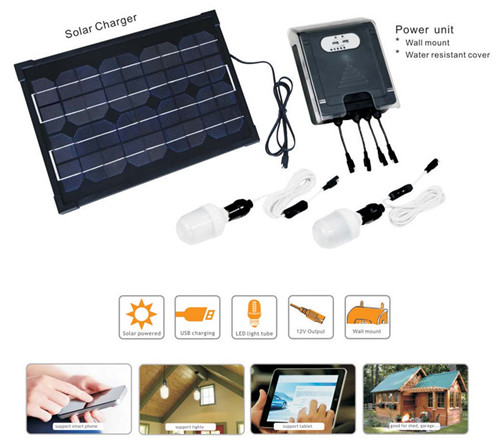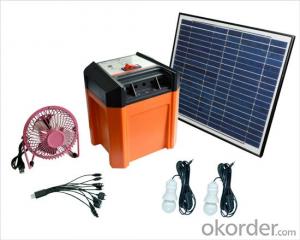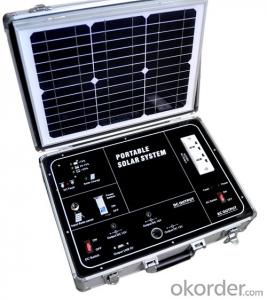TPS-205N 10W Solar wall mount
- Loading Port:
- China Main Port
- Payment Terms:
- TT or LC
- Min Order Qty:
- -
- Supply Capability:
- 50000sets m.t./month
OKorder Service Pledge
Quality Product, Order Online Tracking, Timely Delivery
OKorder Financial Service
Credit Rating, Credit Services, Credit Purchasing
You Might Also Like
TPS-205N 10W Solar Wall Mount Kit
1. 10W Mono Solar panel +12V/7AH Power pack(water resistant cover) + 2pcs 3W LED Lighting with switch +
2pcs USB Charging output (one for iphone and another one for your lamptop)+ 1pcs 12V charging output
2. Working time:more than5 hours for 2pcs LED light, useful for two rooms
3.Mobile phone adapotors and switch wire availbale for power small DC application
Packing Information:
1)1pc*10W Mono solar panel and 1pc*Power pack(metal box)
2)2 pcs 3W LED lights, Switch wire
Outer carton size: 370*165*485mm
Gross weight: 4.9kgs
574 PCS per 20' container
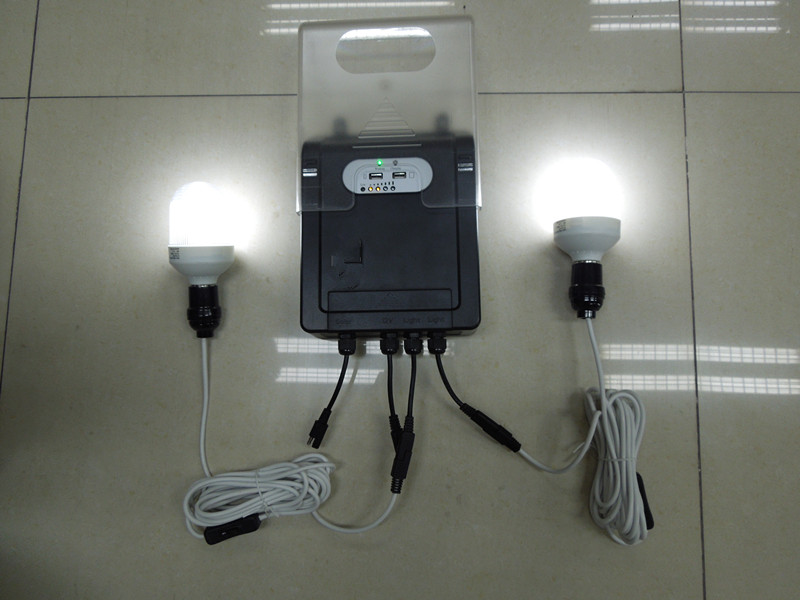
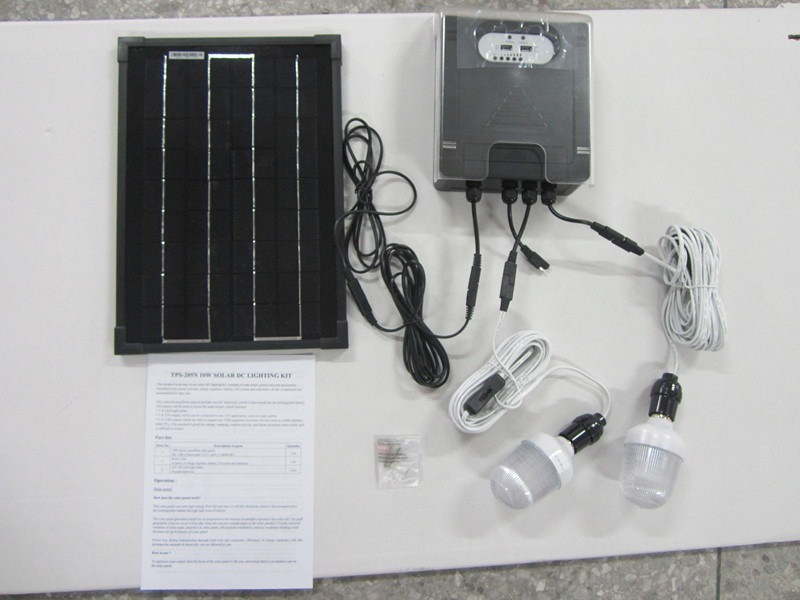
- Q: Can solar energy systems be used for water purification?
- Yes, solar energy systems can be used for water purification. Solar-powered systems, such as solar stills or solar water disinfection units, can harness the sun's energy to purify water by removing contaminants and killing harmful microbes. These systems are particularly useful in remote areas where access to clean water is limited but sunlight is abundant. By utilizing solar energy, these systems offer a sustainable and environmentally friendly solution to water purification.
- Q: How does the performance of solar panels vary based on the type of installation?
- The performance of solar panels can vary based on the type of installation due to several factors. Firstly, the orientation and tilt angle of the solar panels play a crucial role in determining their performance. Ideally, solar panels should be installed facing south (in the Northern Hemisphere) or north (in the Southern Hemisphere) to maximize exposure to sunlight throughout the day. If the panels are not placed in the optimal direction, their energy production may be significantly reduced. Similarly, the tilt angle of the solar panels should be adjusted based on the latitude of the installation site. The tilt angle helps to maximize the amount of sunlight that hits the panels, especially during the winter months when the sun is lower in the sky. Incorrect tilt angles can result in reduced energy output and lower efficiency. The location and surroundings of the installation site also impact solar panel performance. Shading from nearby buildings, trees, or other obstructions can block sunlight and reduce the amount of energy generated. It is crucial to ensure that the installation site is free from any potential shading sources throughout the day. Furthermore, the type of installation also affects the performance of solar panels. There are various installation options available, including rooftop installations, ground-mounted systems, and solar tracking systems. Rooftop installations are the most common, but they can be affected by factors such as roof orientation, shading from neighboring buildings, and limited available space. Ground-mounted systems provide more flexibility in terms of orientation and tilt angle but might require additional land. Solar tracking systems, which follow the sun's path throughout the day, offer the highest energy production but are generally more expensive. Lastly, the quality and efficiency of the solar panels themselves can significantly impact their performance. High-quality panels with better efficiency ratings will produce more electricity from the same amount of sunlight compared to lower-quality panels. Investing in reputable brands and higher efficiency panels can result in improved overall performance. In conclusion, the performance of solar panels varies based on the type of installation, including factors such as orientation, tilt angle, shading, and the quality of the panels themselves. Properly installed panels in optimal conditions will yield higher energy production and increased efficiency.
- Q: Can solar energy systems be installed on mobile homes?
- Yes, solar energy systems can be installed on mobile homes.
- Q: Can solar energy systems be used for powering space exploration missions?
- Solar energy systems have the capability to power space exploration missions. In space, solar energy is a clean and renewable power source that is abundant. It is already being utilized for various space missions, including the International Space Station (ISS), Mars rovers, and satellites. Photovoltaic (PV) cells, also known as solar panels, convert sunlight into electricity. They are lightweight, compact, and easily integrated into spacecraft design. Solar panels are particularly beneficial for missions near the Sun or in well-lit areas of space, as they can provide a consistent and dependable power source. The ISS, for instance, heavily relies on solar power. It is equipped with large solar arrays that capture sunlight and generate electricity to meet the crew's energy needs and power various onboard systems. Mars rovers like Curiosity and Perseverance also employ solar panels to operate on the red planet. Solar energy systems offer several advantages for space exploration missions. Firstly, they eliminate the need for bulky and limited fuel sources such as batteries or radioactive materials, reducing mission weight and costs. Secondly, solar energy systems require minimal maintenance, providing a long-lasting and reliable power source. Additionally, solar power is environmentally friendly, emitting no pollutants or emissions during operation. However, there are limitations to using solar energy in space exploration. For missions that venture far from the Sun or operate in areas with limited sunlight, alternative power sources like nuclear energy or fuel cells may be necessary. Additionally, solar panels are vulnerable to damage from micrometeoroids, radiation, and other space debris, necessitating protective measures and backup systems. In conclusion, solar energy systems have demonstrated their viability and efficiency in powering space exploration missions. Their ability to convert sunlight into electricity, combined with their lightweight and compact design, make them an ideal choice for providing sustainable and dependable power in space.
- Q: Can solar energy systems be used for powering military bases?
- Yes, solar energy systems can be used to power military bases. In fact, many military bases around the world are increasingly adopting solar energy as a reliable and sustainable source of power. Solar panels can be installed on rooftops, open spaces, or even integrated into buildings' facades, providing clean electricity to support the energy needs of military facilities. This not only helps reduce reliance on fossil fuels but also enhances energy security and resilience for military operations.
- Q: Are solar energy systems environmentally friendly?
- Yes, solar energy systems are environmentally friendly. They produce clean, renewable energy by harnessing the power of the sun, which reduces greenhouse gas emissions and air pollution. Solar energy systems have a minimal impact on the environment, as they do not consume water or produce harmful byproducts. Additionally, they help mitigate climate change and contribute to a more sustainable future.
- Q: What are the different applications of solar energy systems in transportation?
- Transportation can benefit greatly from the utilization of solar energy systems in various ways. By incorporating solar panels onto vehicles such as electric cars, carbon emissions and reliance on fossil fuels can be reduced. This not only extends the driving range of electric vehicles but also lessens the need for charging from the electrical grid. Furthermore, solar energy can be harnessed in charging stations specifically designed for electric vehicles. These stations can be equipped with solar panels, allowing them to generate clean electricity for charging purposes. This shift away from non-renewable energy sources contributes to the establishment of a more sustainable transportation system. Another avenue for solar energy systems in transportation is seen in public transportation. By implementing solar-powered buses and trains, cities can offer emission-free transportation options, thereby decreasing air pollution and enhancing air quality. Solar panels installed on the roofs of these vehicles can additionally power various onboard systems, including lighting, air conditioning, and information displays, further minimizing energy consumption. In addition to electric vehicles and public transportation, solar energy systems can also be integrated into other modes of transportation like bicycles and boats. By incorporating solar panels into the design of these vehicles, electricity can be generated to power electric motors or charge batteries. This advancement makes these transportation options more energy-efficient and environmentally friendly. In summary, the applications of solar energy systems in transportation are vast and hold immense potential for reducing greenhouse gas emissions while simultaneously promoting sustainable transportation options. By harnessing the power of the sun, we can create a future for transportation that is cleaner and more environmentally friendly.
- Q: Can solar energy systems be used for powering off-grid agricultural processing facilities?
- Yes, solar energy systems can be used for powering off-grid agricultural processing facilities. Solar panels can be installed on the roofs of these facilities or in nearby open spaces to capture sunlight and convert it into electricity. This renewable energy source can provide a consistent and reliable power supply for various agricultural processing operations, such as irrigation systems, grain milling, food drying, and cold storage. Additionally, solar energy systems can be combined with battery storage to ensure uninterrupted power supply even during cloudy days or at night. This can significantly reduce reliance on fossil fuels, lower operating costs, and promote sustainable agricultural practices.
- Q: Can solar energy systems be used for powering electric vehicle solar charging garages?
- Yes, solar energy systems can be used to power electric vehicle solar charging garages. Solar panels can be installed on the roofs or surrounding areas of the garages to generate electricity from sunlight. This renewable energy can then be utilized to charge electric vehicles, reducing the dependence on fossil fuels and decreasing carbon emissions.
- Q: How does the color of solar panels affect energy production?
- The color of solar panels does not significantly affect energy production. The color of solar panels is mainly determined by the materials used in their construction, such as silicon or thin film. These materials have different absorption properties, but they are optimized to absorb sunlight and convert it into electricity regardless of color. However, it is worth mentioning that darker-colored solar panels may absorb slightly more heat from the sun compared to lighter-colored ones. This can lead to a slight decrease in overall efficiency as the temperature of the panels increases. To mitigate this, manufacturers often use various cooling techniques, such as placing the panels on raised mounts or incorporating cooling systems, to maintain optimal operating temperatures. Ultimately, the primary factor influencing energy production in solar panels is the amount and intensity of sunlight they receive, rather than their color. Factors like the angle of installation, geographical location, shading, and cleanliness of the panels have a much greater impact on their energy output.
We are a fully vertically integrated solar manufacture and distribution company with a variety of product lines from crystalline solar cells & modules, thin film solar modules, solar stand alone systems to ultra clear PV glass. Started since 1992 as the No. 1 thin film PV module manufacturer in China, Topray engaged both mono crystalline and poly crystalline production from 2005, becoming the most diversified solar manufacturer in China ever since.
1. Manufacturer Overview
| Location | Shenzhen,China |
| Year Established | 2002 |
| Annual Output Value | Above US$80 Million |
| Main Markets | Europe, North America, Africa and Asia. |
| Company Certifications |
2. Manufacturer Certificates
| a) Certification Name | |
| Range | |
| Reference | |
| Validity Period |
3. Manufacturer Capability
| a) Trade Capacity | |
| Nearest Port | Shenzhen shekou |
| Export Percentage | 90% |
| No.of Employees in Trade Department | 200-300People |
| Language Spoken: | English;Chinese; |
| b) Factory Information | |
| Factory Size: | Above 300,000 square meters |
| No. of Production Lines | Above 10 |
| Contract Manufacturing | OEM Service Offered;Design Service Offered |
| Product Price Range | Average |
Send your message to us
TPS-205N 10W Solar wall mount
- Loading Port:
- China Main Port
- Payment Terms:
- TT or LC
- Min Order Qty:
- -
- Supply Capability:
- 50000sets m.t./month
OKorder Service Pledge
Quality Product, Order Online Tracking, Timely Delivery
OKorder Financial Service
Credit Rating, Credit Services, Credit Purchasing
Similar products
Hot products
Hot Searches
Related keywords

